Christianity
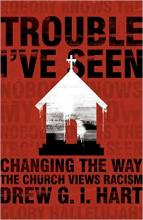
Since the beginning of the modern era almost 500 years ago, Western culture has been marked by a distinct aversion to history. Thus we have come to narrate our lives primarily through our stories as (seemingly) autonomous individuals, instead of through the social stories of the peoples and places to which we belong. One of the unfortunate consequences of this shift is that we often become blind to the socioeconomic narratives that have set the stage for our present lives.
One of these is white supremacy, which has shaped the geographical, educational, and economic systems of our land over many generations and played a formative role in the life of almost every American. In his excellent new book, Trouble I’ve Seen: Changing the Way the Church Views Racism, Drew Hart turns our attention to this story and particularly to the ways it misshapes our Christian faithfulness. Hart begins the book with a description of how racialized our lives are. Historically, nonwhites were excluded from many important spaces in U.S. public life: schools, governmental positions, and even churches. Although few, if any, of these spaces today explicitly exclude nonwhites, our socioeconomic systems are rooted in these earlier eras and continue to promote a highly segregated way of life. “When we can be honest about how our entire society is deeply racialized,” Hart says, “we will be ready to move forward.”
Hart reminds us that race is not simply about the color of one’s skin but also about power and the question of who gets to dictate the course that our society will follow. Early in the book, he spends a chapter exploring how our understanding of Jesus is often too white. We are inclined to imagine Jesus as an influencer, one who works in the upper echelons of our hierarchical society and who has the power to control the course of society. Hart emphasizes that this is not the Jesus that we find in the gospels, who aligned himself with the marginalized and who mostly rejected hierarchical society. “Where the old order dominated and violently lorded over others,” Hart observes, “the kingdom of God arose from the bottom, margins, and cracks of society, freely inviting people to share in the peace and justice of God made available in the presence of Jesus.”
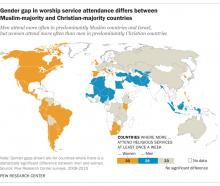
Fewer men than women show up in U.S. churches, and women are markedly more likely to pray and to hold up religion as important. But in Muslim nations, it’s the women who are missing in action at the mosque — and yet they’re on par with men in upholding almost all the Muslim pillars of faith.

1. In the midst of a historically horrible refugee crisis, why didn’t you actively pursue helping the poor, the destitute, and those in desperate need?
Are followers of Jesus supposed to forsake compassion, sacrifice hospitality, and abandon love in favor of a political policy, national security, financial stability, and personal comfort? God is perfectly clear what the mandate is for helping those in need, and yet Christians continue to remain apathetic, passive, and even aggressively hostile toward the notion of aiding such victims.

“The ultimate tragedy is not the oppression and cruelty by the bad people but the silence over that by the good people.”-Martin Luther King Jr.
This week at Liberty University, Donald Trump was given a platform to address evangelicals. Much has been written on why Donald Trump is patently unqualified to be speaking on a day where we celebrate the lasting impact of Martin Luther King Jr.’s fight against oppression. His racist and xenophobic policy proposals include mass deportations, barring Muslims from travelling to the United States, and creating a registry to monitor Muslims in America. Lending legitimacy to him is entirely contradictory to the life and mission of Martin Luther King Jr.
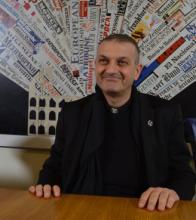
A Syrian priest held hostage for months by the ISIS terrorist group is certain his life was saved due to his interfaith work, despite being threatened with beheading by jihadists if he did not renounce Christianity.
The Rev. Jacques Mourad, a Syriac Catholic priest, was taken hostage in May from the Mar Moussa monastery, situated between the capital Damascus and the city of Homs. He and a volunteer from the monastery were forced into a car and driven for four days, during which time Mourad said he thought he would be killed.
“We could only perceive the sense of the desert. In that moment … I thought it was over,” he told members of Rome’s Foreign Press Association on Dec. 10, the first time he has spoken in detail about his odyssey since he escaped.

As October quickly turned to November, jack-o-lanterns and costumes were replaced by Christmas carols and Internet outrage over holiday cups. Every year we go from Halloween to Christmas with little space carved out for Thanksgiving.
There is no question that Thanksgiving is my favorite holiday. Many times I have remarked that Thanksgiving is one of the greatest days of the year, that I cannot wait to go home, that Christmas needs to wait until December. Come every November, I begin my internal countdown, growing more excited each day closer to this holy holiday.
We often reserve the word “holy” for holidays such as Christmas and Easter, but for a multi-faith family such as my own, a holiday grounded in something more substantial than – let’s say trees for Arbor Day – while still allowing everyone to come with their own religious identity is not only a privilege, but a gift.

“Greater contraceptive access should not be a matter of debate,” says Dr. Jeffery Peipert. But try telling that to those making the decisions for our government and churches.

Christians do a disservice to the gospel message by removing the cultural context from Jesus’s ministry and watering down his message to one of religious platitudes. We like to generalize the words of Jesus and transform his life into a one-size-fits-all model that can apply to all of humanity.
Throughout the New Testament Jesus was more complex than we give him credit for.
He intentionally, purposefully, and passionately addressed very specific causes. He radically addressed the diverse and complicated conflicts of the time and shattered the status quo.
Jesus wasn’t just preaching a universal salvation message for the world, but he was also addressing specific political, social, and racial issues. He was helping those who were being abused, violated, and oppressed.

Ultimately, Christianity is about Jesus — not Christians. Although we try our best to emulate Jesus, we constantly fail, but please judge our faith based upon Jesus and not our Christian culture — because they aren’t the same thing.
Inevitably, we’ll continue to be polarizing in numerous ways across political, social, and religious platforms, and we’ll still commit bad mistakes, make hurtful remarks, and end up being wrong about many things. But for most Christians, our ultimate desire is introduce people to Jesus, who inspires us to make the world a better place by loving everyone around us to the best of our ability. God help us.

As a child growing up in the church, if there was one message I heard over and over again, it was that God was in control, and most importantly, God loved us — and we actually had fun.
This was a comforting message and environment. Furthermore, the themes of joy and God’s defeat of evil became even more prominent during my teen years.
But then youth group ended, and I entered the realm of adult Christendom: political causes, doctrinal debates, worship wars, traditional vs. modern bickering, congregational infighting, gossip, church splits, corporate boycotts, moral rage, judgment, and fear.

The early Christians had to deal with the loss of their most important mandala — the one they called their Lord and Savior, Jesus Christ. Isn’t Christianity weird? I mean, Christians revere Jesus the Messiah, the King. That’s weird because the one Christians revere as the incarnate word of God was killed. He became a victim of human violence.
How do you atone for that? How do you reconcile with the fact that the one whom Christians worship became a victim of human violence?
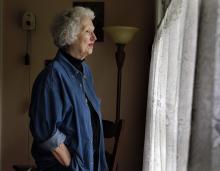
Her once boundless energy starts to fail by midday. She started radiation treatment on May 21, mainly in an effort to forestall the possible collapse of her spine, which would leave her helpless and in intractable pain.
“That sounds a little formidable to me,” she says.
“I was never much for suffering.”
She goes on, her words carefully chosen. “Am I grateful for this? Not exactly. But I’m not unhappy about it. And that’s very difficult for people to understand.”

The center of Christianity has dramatically shifted, and that means the agenda was very different from the northern and western agendas of the older white evangelicals in America and the issues they think most important. Korea could play a particular and convening role as a bridge between the churches of the global north and south.
In sharp and grateful contrast to the old ideologies of global North evangelicals, these global South evangelicals spent their time together wrestling with issues of global economic inequality, the realities of climate change, the imperatives of racial justice, and the need for Christians to wage peace instead of war. Since these are the issues that global evangelical and Pentecostal constituencies are facing in their own lives — and of course, the Bible addresses all of them as the central issues Christians need to confront today — the narrow, white American evangelical agenda had no interest in this global evangelical and Pentecostal forum. The fact is that they represent a different evangelical world.

What’s it like to share your stories of loss to a room of hundreds? Wm. Paul Young (author of The Shack), Reba Riley (Post-Traumatic Church Syndrome), and Christian Piatt (PostChristian) are about to find out — and help others do the same. The three bestselling authors are launching a two-stop tour — "Where's God When..." — in Seattle and Portland on May 16 & 17, to help others hear, and share, their own stories of grief, heartbreak, and healing.
Sojourners sat down with the authors last week to talk loss, return to faith, and what it’s like to coordinate a tour focused on hard questions about God. Interview edited for length and clarity.

The definitive characteristic of Christian faith is that it is rooted in a historic event. We are the Resurrection People because the core of our belief, faith, ethics, and future hope lies in the 33 precious years of our God incarnated, culminating in him, the Suffering Servant, being nailed to that old rugged cross, and his subsequent rising from the dead.
The Christian faith has always been about God coming to save us in human form.
Everything we know about what it means to be a Christian is clothed with humanity. Jesus followers learn of what it means to be Christian by way of human relationships. We recite and affirm historical creeds passed down to us through the cloud of witnesses, the generations of believers before us. We are instructed in the moral values that align with Christian teaching by our mothers and fathers, whether biological or spiritual. Our local church community is our ethics classroom, a place where we practice, learn, and grow, working out our salvation and mobilizing the revolution of God in our particular corner of the world.

Could Christianity's future lie in Buddhism's past? This is a possibility that's been haunting me lately, but in a good way, I think.
One big critique, understandably, of postmodern views on Christian spirituality is that there's too much time and energy spent deconstructing old systems and ways of thinking that need to be torn down or reimagined, while lacking the same effort to build up something more helpful — more Christ-like — in its place.
This is true, and I'm as guilty of it as anyone. In my current spiritual practices as part of the current year I'm calling “My Jesus Project,” I'm trying to more fully understand what we mean when we talk about following Jesus. So it might seems strange to some that I would look to Buddhism for help in rebuilding my daily walk along the path of Christ.
Author and monastic Thich Nhat Hanh wrote a book years ago called Living Buddha, Living Christ, that had a profound impact on me. At the time, I was “A-B-C,” or “anything but Christian.” I had been thrown out of my church of origin for asking too many questions, and up to that point, I assumed there was no way I could ever associate myself with Jesus or the Gospel again. Thankfully — if surprisingly — it was a Buddhist monk who reintroduced me to Jesus.
In his book, he draws many parallels between the life, teaching, and practices of Jesus and those of Siddhartha Gautama, later known as The Buddha after achieving enlightenment. For Jesus, I imagine a similar experience of enlightenment coming to him during his monastic retreat into the desert. And as I seek my own moments of illumination during My Jesus Project, it occurs to me that Buddhism has much to teach us about where we might take Christianity in the 21st century.
No Ego
One of the greatest weaknesses of modern Christianity has been the focus on the individual. This comes more from our individualistic culture than from Christianity itself. Though we focus on personal (often translated as sexual) sin, the idea of sin within the Hebrew Bible was more corporate. There was more of an interdependent, tribal culture, and as such, so were the shortcomings. We've also focused too much on personal salvation or a “personal relationship with Jesus Christ,” which has also led to such bastardized interpretations as the false gospel of personal prosperity.
In Buddhist practices, one must learn to let the self die, in a manner of speaking, in order to create a deeper, more meaningful relationship and interdependence with others and the rest of creation. This is actually more consistent with ancient Jewish and Christian thought than our modern, egocentric version of Christianity.
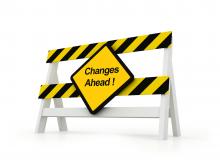
How can some Christians exude such cruelty and ignorance while simultaneously claiming to follow Jesus — a humble man who was radically loving and ultimately died for sake of humanity?
There are many reasons, but here are some of the main factors, characteristics, and influences that cause some faith-based individuals, communities, and organizations to become aggressively bigoted instead of generously benevolent.
1. They fear change.
Some people hate change and see it as an attack on their beliefs. Since their Bible is inerrant and their God is unchanging, new ideas are dangerous and subversive to their flawless theology. Perfection cannot be improved upon, so any variation or contradiction is perceived as absurd. Discovery, learning, and creativity are often prohibited, and new ideas are viewed as a dangerous threat to their way of life.
Historically, this is why many Christians were shamefully ignorant and embarrassingly wrong when it came to addressing issues such as slavery, civil rights, the Holocaust, recognizing genocide, and combating AIDS (just to name a few). Unfortunately, many Christians continue to be closed-minded and refuse to see beyond themselves.
2. They’re privileged.
Change is hard to accept when things are working in your favor. As the common expression goes: “Why is change a good thing?”
Any theology, idea, or sermon that challenges people to sacrifice or reach beyond their comfort zone isn’t easily accepted.
Many Christians defend their position so passionately because the greatest beneficiaries of their worldview are themselves. New paradigms are stubbornly rejected by those benefitting from being the privileged majority. Anything “different” is seen as an illogical attack against their entitled position, and feelings of discomfort cause them to become even more insular.
But if these same Christians sense that they’re the ones being persecuted, abandoned, ignored, or losing power, they become more accepting of different opinions, contrasting ideas, and new ways of thinking.
Anything profitable and favorable is preferred over anything requiring sacrifice. Thus, the Gospel of Christ is continually counter-cultural to the practices and lifestyles of many Christians who refuse to acknowledge, admit, or forsake their privilege.
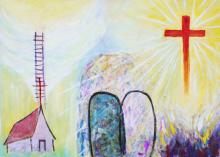
Instead of promoting Christ, Christians often promote …
their theology
their culture
their values
their creeds
their traditions
their spiritual practices
their specific type of baptism
their required form of communion
their style of sermon
their church
their denomination
their definition of salvation
their philosophy of evangelism
their form of ministry
their brand of worship
their interpretation of Revelation
their interpretation of the Bible
their favorite leadership model
their social customs
their laws, rules, and regulations
their political beliefs
their moral values
Imagine if Christians introduced people to their God instead of their religion.

The notion of America as a mostly white, mostly Christian country is rapidly becoming a fact for the history books.
“The U.S. religious landscape is undergoing a dramatic transformation that is fundamentally reshaping American politics and culture,” said Dan Cox, research director for Public Religion Research Institute.
Last week, PRRI released the American Values Atlas, an interactive online tool that compiles data about Americans’ opinions, identities, and values. One of the biggest takeaways of this years’ study was that, for the first time ever, America is not a majority Protestant nation.
A couple of folks I really respect – Kate Gould of Friends Committee on National Legislation (aka, the Quaker Lobby), and Jim Wallis of Sojourners – were recently on the O’Reilly Factor. For those of you who don’t watch cable news, this is a television program where Bill O’Reilly basically screams at people and incites hatred of anything non-white, non-rich, and non-Republican. I normally don’t watch the show. But when I heard that Kate and Jim were going to be talking, I tuned in.
I knew almost immediately this wasn’t going to be good. It’s Bill’s program, so he gets to frame the question. Here’s what he asks: Do Christian pacifists have a solution for stopping ISIS?
It’s the wrong question.